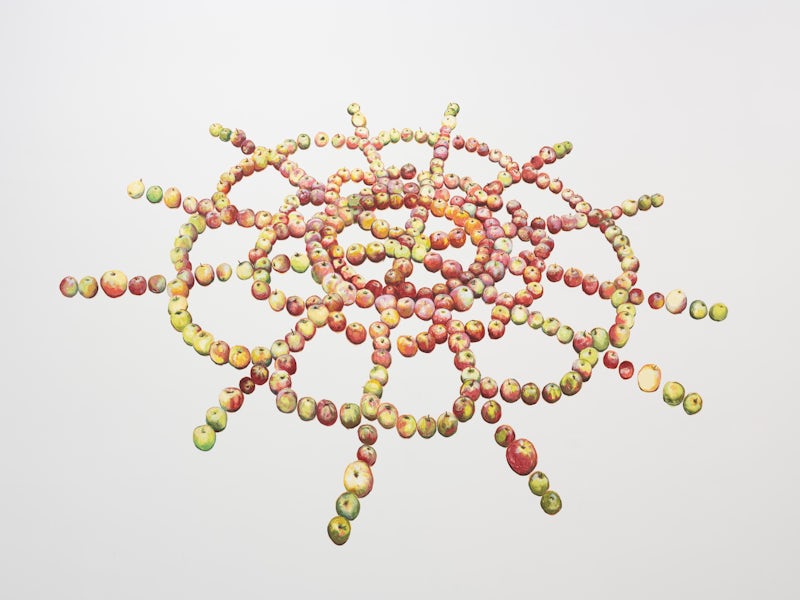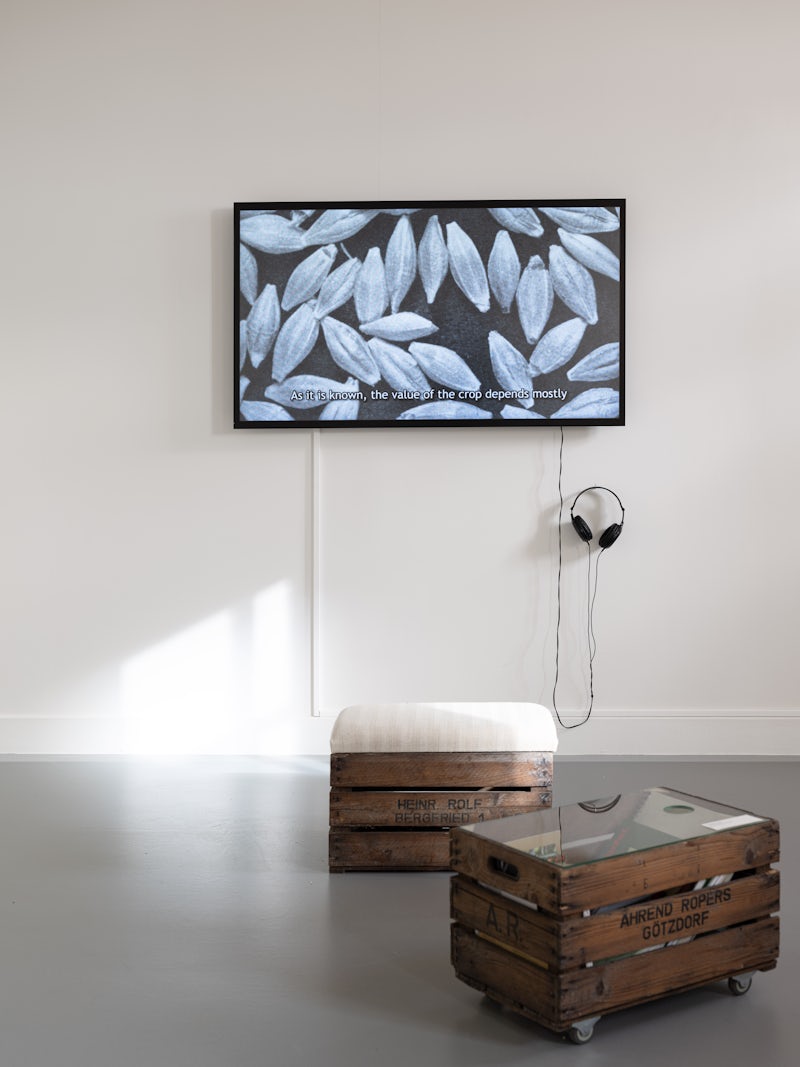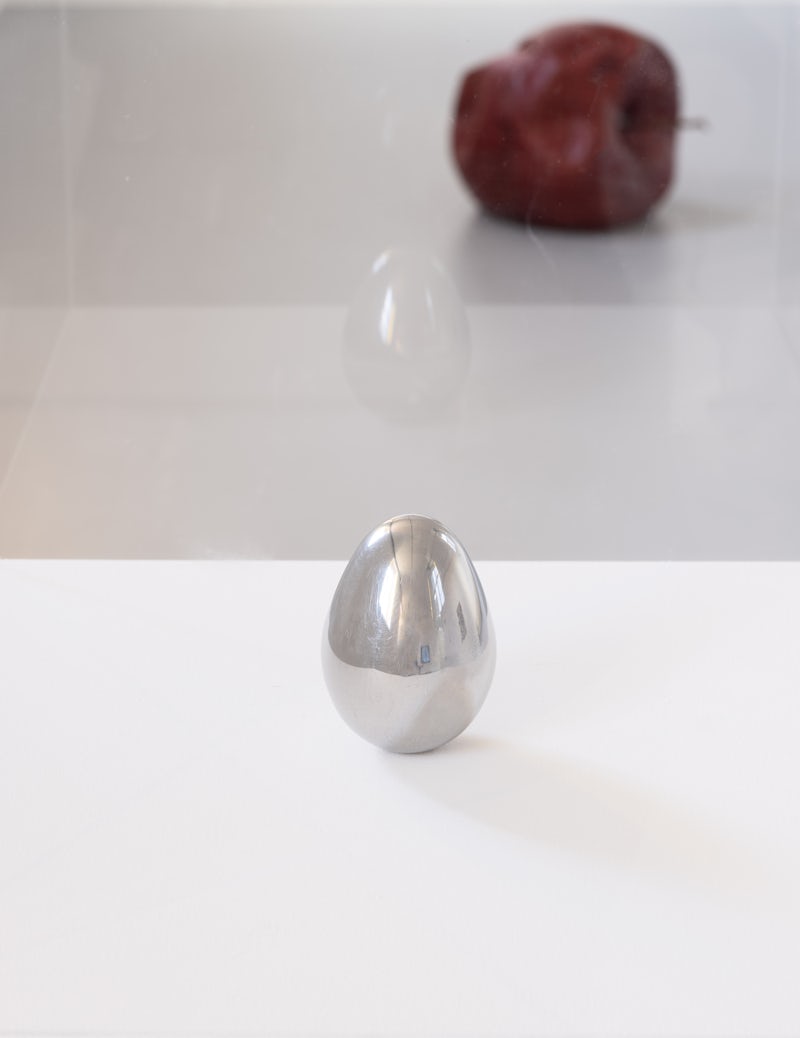Antje Majewski and Paweł Freisler — Apple. An Introduction (over and over and once again)
29 Feb 2024 - 5 Jan 2025

How many apple varieties are there? Where do wild apple trees grow? What does the freedom of apples entail? Conceptual artist Pawel Freisler and artist Antje Majewski explore the dual nature of apples as both an object of art and a reference point in discussions about the loss of biodiversity. They have been working together for a decade now, alongside other artists, activists, scientists, and researchers. Apple. An Introduction (over and over and once again) delves into philosophical questions about the origin of knowledge and the nature of objects.
With guest works by Chantal Akerman, Agnieszka Polska, Jimmie Durham, Ian Hamilton Finlay, Joris de Rycke, Kasper De Vos and many more. Curators: Joanna Zielińska en Anne-Claire Schmitz.
ON VIEW
The museum’s top floor will be transformed into an engaging installation dedicated to apples. Pawel Freisler’s intricately crafted apple sculptures are shown alongside Antje Majewski’s paintings of various apple varieties, inspired by the still-life tradition. The display will be developed during a year-long process, in collaboration with local artists, pomologists, and other scientists. Visitors will have the opportunity to access materials such as books, documents, films, and poems. Together, this creates an interdisciplinary collection of knowledge, shedding new light on the relationships between apples, people, and the broader ecosystem.
The second part of the Superhost project, opening on 18th of May 2024 at 15.00, introduces us to a deeper knowledge about apples. Following our project’s objectives, the space on the museum’s top floor will be transformed to accommodate new artworks by Joris de Rycke and Alma Museum, literally ‘Apple Museum’ from Almaty. Pomologist Paul Van Laer will give a lecture; Antje Majewski and Azhar Jandossova will introduce the Alma Museum.
The Alma Museum (Almaty, KZ) which is dedicated to Malus sieversii, will be hosted for a temporary appearance in Antwerp. The exhibition includes photos of Sievers apple trees and their fruits from Zhongar and Trans-Ili Alatau; photos of apples of Aport variety; archive photos provided by the State Photo-Video Archive of the Republic of Kazakhstan; photos by Aymak Djangaliev; and children’s drawings and other materials from the collection of Alma Museum Almaty. Curator of the Alma Museum: Azhar Jandossova
In Help us to save the Wild Apples of Kazakhstan! (2023), Majewski recorded the voices of apple activists from Almaty. They tell us about the urgency to help preserve Malus sieversii. With the participation of Azhar Dzhandossova, Ruslan Konyshev, Vasilisa Konysheva, Karlygash Makatova, Zhanna Mambetova, Saule Sadenova, Laura Shadmanova, Svetlana Spatar.
In Joris de Rycke’s ongoing project Pomology the idea of varieties itself is questioned. He shows us apple trees found growing from discarded apple cores in the surroundings of Antwerp. As apple trees can’t self-pollinate, every tree that grows from a seed is a new unnamed variety. Since 2019, these apples are documented, named and the ones with an interesting taste and qualities are propagated by grafting. Their unique tastes and qualities are copied into new trees that are nursed in an orchard at the Verbeke Foundation (Kemzeke). In time they will be planted back into the landscape.
Kasper de Vos enlarges one of the most beloved apple varieties, a Pinova, into a giant wax fruit, which seems familar and strange at the same time.
Pawel Freisler’s intricately crafted apple sculptures are wondrous objects, requiring time in their making – their composition as art objects – and the stopping of the biological time of decomposition of an apple for a limited time. They permit us to think about the body in relation to time, but also about the concept of artworks as timeless objects. Freisler’s digital photographs record apples in gardens, homes and supermarkets, where he observes their beauty and transformations, but also their packaging and marketing. Biological, always changing subjects transform into objects within both the world of commerce and art.
Antje Majewski’s still-lives of apple varieties picture historical, almost-forgotten varieties like the Uelzener Kalvill or Landsberger Renette as well as new trademarked varieties such as Red Love or the first genetically modified variety, the Arctic Apple. The images feature a wealth of color, shape and surface texture, rendering each variety as a monument of its own.

As part of the presentation, one can discover Majewski’s documentary The Freedom of Apples, which highlights the problems caused by the disappearance of less commercially viable apple varieties, and the importance of preserving Kazakhstan’s wild apple forests. This extends to broader issues of global food production, the impact of technology and breeding on agriculture, political and ethical implications of new developments in genetic engineering, and the influence of the global economy.
The artists propose a new tradition of community apple tree planting in urban spaces, in order to foster collective engagement and the greening of cities. This initiative aims to unite a diverse public around a common goal, and to create areas in cities where urban life quality and social cohesion is improved and people can have free access to produce.


ACTIVITIES
During three public moments, the artists invite you to take part in an artistic journey around apples:
– At the launch of this project on 29 February 2024, Antje Majewski will give a talk with a special focus on the artistic dimensions of apples. The lecture takes place within the framework of M HKA’s new programme FRONT ROW, organised together with NICC.
– Did you know that the main ancestor of our apple trees comes from Kazakhstan?
You can visit a real apple museum from Almaty, temporarily hosted by M HKA.
And during an event on 18 May, we will discuss the origin and distribution of apples with experts.
– Autumn is the season to plant apple trees, but it is also the time to harvest apples. On 22 September, during DAKkan festival, Antje Majewski invites the public to make an apple ornament, celebrate together, and plant an apple tree in the city.
SUPERHOST 2024: WHO AND WHAT
Pawel Freisler is an experimental conceptual artist – day and night. In the 1970s he emigrated from Poland. He lives in Malmö and works in Trelleborg (Sweden). Information about his work consists mainly of anecdotal stories, such as abandoning active participation in the art scene or taking up gardening, often filled with gossip, rumours, fairy tales, legend, fabrications – fabrications or personal connections with the artist.
Antje Majewski’s practice comprises paintings, video works, texts and performances, and is informed by anthropological and philosophical questions. Majewski questions objects, territories, and plants, and focuses on research into alternate systems of knowledge, storytelling, and the potential of transformative processes – with a particular interest in cultural and geobotanical migration. An integral part of Majewski’s aristic process is her recurring collaboration with other artists, ecological groups, and urbanism-focused collectives. Since 2014 she has been working together with Polish artist Pawel Freisler on the apple project.
Superhost is a programme investing in a yearlong relationship between an artist or collective practice, the museum, and its participating communities, and supporting the production of artworks, performative or discursive creations. One artist or collective is invited to be M HKA’s Superhost every year. By embracing the ambiguous and interrelated dynamics of hospitality – in which the host is always a guest; the guest always also a host – M HKA affirms a longing for increased institutional transformation, permeability, and exchange. The invitation materialises freely, both in the museum’s top-floor gallery spaces and as programmes of discursive and performative events.
Superhost 2024 is part of the Museum of the Commons (2023-2026), a project by the museum federation L’Internationale, of which M HKA is a member. The Museum of the Commons weaves together three thematic strands: 1) Climate; 2) Situated Organisations; and 3) Past in the Present. All three align with the major challenges contemporary societies face. The ‘climate’ theme revolves around the current planetary climate crisis, the sustainability of institutional, artistic, and cultural practices and processes, and the urgency to transform our political processes, societies, cultures, and lifestyles more ecologically.
L’Internationale brings together seven major European art institutions: MSU (Zagreb); Museo Reina Sofí a (Madrid); MACBA (Barcelona); M HKA (Antwerp); MSN (Warsaw), Salt (Istanbul), Van Abbemuseum (Eindhoven), with Institute of Radical Imagination (Venice), tranzit.ro (Bucharest; Cluj; Iasi), HKW (Berlin), and VCRC (Kyiv). L’Internationale works with complementary partners such as HDK-Valand (Gothenburg), NCAD (Dublin) and ZRC SAZU (Ljubljana) along with with associate organisations from the academic and artistic fields, IMMA (Dublin) and WIELS (Brussel).